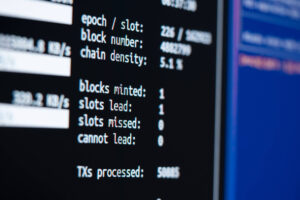Validators are the backbone of many blockchain networks, especially those that rely on the Proof-of-Stake (PoS) consensus mechanism or related variants. They play a central role in verifying transactions and ensuring the integrity of the network.
A validator is a network participant who verifies transactions, proposes new blocks, and protects the network from manipulation. Unlike Proof-of-Work systems like Bitcoin, where miners compete through computational power, Proof-of-Stake takes a different approach: validators must deposit a certain amount of the native cryptocurrency (e.g., ETH on Ethereum) as a stake. This stake serves as collateral and an incentive for honest behavior - since in cases of misconduct, the stake can be partially or fully “slashed” (confiscated).
Validators and decentralization
Validators take turns creating new blocks or confirming existing ones. Once a block has been validated and enough other validators approve it, it is permanently added to the blockchain. This process ensures consensus on the current state of the network – decentralized, secure, and efficient.
As compensation for their services, validators receive rewards in the form of the respective cryptocurrency. These consist of block rewards and, in some cases, transaction fees. Individual users can often become validators themselves - or delegate their capital to existing validators in order to participate in staking without having to run the technical infrastructure themselves.
The number and geographical distribution of validators are crucial for the decentralization of a network. The more independent validators participate, the harder it becomes for individual actors to control or manipulate the system. Platforms like Ethereum or Cosmos therefore aim for the largest and most diverse validator set possible. At the same time, access to validator status is often tied to technical requirements and a minimum financial stake, which can exclude smaller participants. To overcome this barrier, many networks offer delegation options: users can delegate their tokens to existing validators, thereby indirectly contributing to network security - while also earning rewards.









